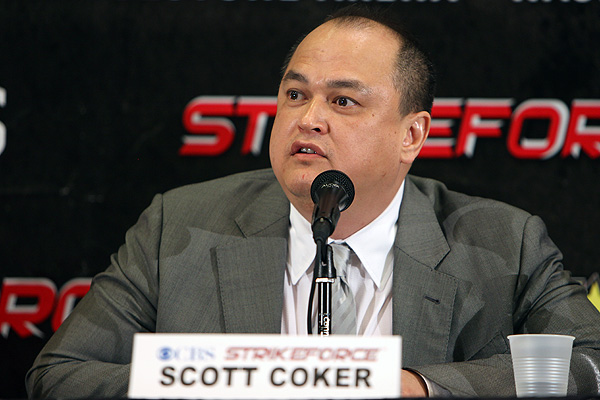In Capable Hands
Rising from Strikeforce’s Ashes

Scott Coker has ambitious plans for Bellator in 2015. | Photo:
Dave Mandel/Sherdog.com
Coker is also a risk taker. When he was 20, he got wind from a student with whom he was working about the Professional Karate Association coming to San Jose and how ESPN was looking for a local promoter to put together the show. ESPN in the early 1980s was not the sports monolith it is currently. Content was filled with Australian Rules football and mid-level college football reruns and sprinkled with some pro wrestling and PKA. It offered opportunities to young, creative go-getters. A sophomore at West Valley Junior College in Saratoga, Calif., Coker bit at the chance.
“I had no idea what I was doing,” Coker said with a laugh. “I didn’t know the first thing about being a promoter. We had 2,300 people there, and I think I made about $8,000. I’m 20 and just made $8,000. You think I was going to give that up?”
Advertisement
“We had some popular stars who were doing well when K-1 started coming after me, but I said no at first before I decided I could do both, doing shows for K-1 in Vegas and promoting kickboxing for ESPN,” Coker said. “At that time, when I was going through that promotional escapade, I opened a martial arts school at night. All the segments through my promotional career, I look at the early years as getting my high school diploma. With PKA, that was like getting a two-year college degree. The work with K-1 was like getting a four-year degree. When I began Strikeforce, that was like getting a Master’s degree. This stage with Bellator is like getting a PhD. If I didn’t have the PKA karate back in the 1980s, if I didn’t work with international fighters in K-1 and create Strikeforce, if I didn’t learn the stadium and casino business, if all those pieces didn’t come together, I wouldn’t be in this position doing what I’m doing today.”
Coker admits he did not know what he was getting into when he took
over Bellator on June 18, 2014, replacing founder and CEO Bjorn
Rebney. He had to find out more about the ownership group and what
resources he would have at his disposal. The further Coker delved
into Bellator, with its network connection to Spike TV and the
commitment from Viacom ownership to open the coffers and attract
better talent, the more comfortable he became with accepting the
reins. In 2015, Coker plans on creating championships and on
growing the younger portion of the Bellator roster. He may be
looking at some of the free agents to build Bellator to a point
where, in two years, it can rival the
Ultimate Fighting Championship for the best roster in MMA.
“
I really believe in times of
desperation and despair,
I always felt through martial
arts teaching that perseverance
would win in the end and we’d
always be OK.
”
“I really believe in times of desperation and despair, I always felt through martial arts teaching that perseverance would win in the end and we’d always be OK,” he added. “Maybe not in the early days, back in the 1980s, when I was probably yelling and screaming my head off when I didn’t know what I was doing, but once I learned what I doing, I always felt like we’re going to be fine; we’re going to be OK. It’s a lifelong journey and it’s always been my duty to give back. With Spike TV and Viacom backing us, we can build Bellator to become a power.”
From a distance, Reyes beams when he watches his once-young pupil.
“Scott will be successful in anything he does,” he said. “I say I learn from him. He’s my teacher. The things he’s showing me is beyond what I thought I taught him. The things I once said to him he’s taken to the next level and [he is] living it.”
Related Articles








